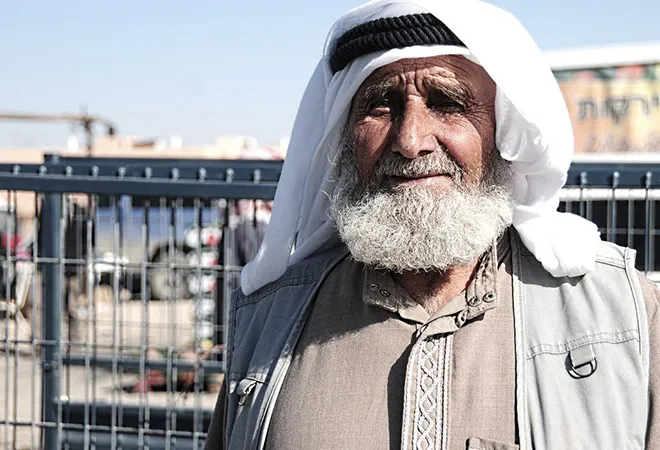-
CENTRES
Progammes & Centres
Location

Few regions in the world today are as consequential as the Gulf. The Gulf, which was viewed as a theatre for great power making wars, now houses one of the most radical organisations in the world that promotes extremism and violence. Given the region’s centrality in the global energy economy as a key oil exporter, the Arab Spring, and developments since then have shaken the regional security order in the Middle East, impacting the entire world. Even as the Gulf embraces economic diversification to move beyond its oil business, it confronts some of the most difficult challenges that have arisen within as a result of external actors such as the US and China.
The Raisina 2019 conversation on ‘Bridging the Gulf – Towards New Politics and Economics of a Dynamic Geography’ investigated some of the predominant tensions in the region while also exploring the aspiration for change, emerging from ongoing economic transformations and the challenges faced in this process. The discussion explored potential solutions to these challenges that could create a stable and sustainable environment in the region.
Various analysts view the Gulf as a battleground between Saudi Arabia and Iran, nations that have been rivals for regional hegemony for years. The bitterness between the two nations has intensified after the US re-imposed sanctions on Iran in 2018. The US and its allies continue to blame Iran of being a hegemon in the region, which Iran has refuted several times.
According to Volker Perthes, “Ironically, Saudi Arabia and Iran are the main antagonists rather being protagonists of a common regional order, irrespective of their understanding of the need for domestic reforms.” The US re-imposition of sanctions on Iran has weakened the Iranian economy through by impacting oil exports. Seyed Mohammad Kazem Sajjadpour, while reiterating that Iran is not a hegemonic power in the region, stated, “Iran is willing to cooperate with Saudi Arabia to diffuse tension in the region.” Nevertheless, one cannot overlook the unabated tension in the region that has pushed back the domestic reforms initiated by both countries. In Iran, President Rouhani failed to capitalise on the reform process that was initiated after sanctions were removed by the Obama administration. It is believed that in spite of the revenue generated through increased oil exports, supported by higher oil prices over several months, the Iranian economy continued to see sluggish growth and rising unemployment. This led to nationwide protests.
In the case of Saudi Arabia, its resilience to global oil price falls was tested. This prompted Prince Muhammad Bin Salman to take decisive action towards an economic transformation of the kingdom, which was built on cheap gasoline, electricity and water over the past several decades. Vision 2030 laid down the specific goals that could help Saudi Arabia prepare for a future beyond oil. However, the continuing low oil prices affected the pace of the Kingdom’s transformation from a petro-state into a diversified economy. This situation led to a shrinking of the state budget, and a suspension of large projects, which in turn increased unemployment. The sharp increase in oil exports led by a shale boom for the US, particularly in Asia, made the conditions challenging for even Saudi Arabia, let alone high-cost oil producers. This put a strain on Saudi Arabia’s diversification plans, the biggest fallout of which was observed with the delay of the initial public offering (IPO) of 5 percent of Saudi Aramco, which was aimed at raising $100 billion for investments in other sectors.
The long-standing discrepancy continues between the Gulf and the Maghreb countries (or countries in Northern Africa). This incongruity also acts as a stumbling block for the development of the region. Countries from the Gulf and the Maghreb disagree on several issues of regional and economic importance, primarily due to disparity in geo-strategic priorities, incongruity of economic interests, and political positioning.
As noted by Dalia Ghanem- Yazbeck, security concerns of the Maghreb do not always align with those of the Gulf. For instance, Yemen, the main concern for the Gulf, is not a significant concern for the Maghreb, highlighting the difference between the regions’ geo-strategic priorities. On the economic front as well, there is a striking difference in the MaghrebGulf trade relationship vis-à-vis trade between Maghreb and the European Union (EU). For instance, while less than one percent of Maghreb export goes to the Gulf Cooperation Council (GCC), accounting for 2.5 percent of GCC import, all Maghreb states except Libya have trade agreements with the EU, signifying the depth of Maghreb-EU trade. In addition, Algeria remains the third largest energy provider to the EU after Russia and Norway. Moreover, the political positioning of the Maghreb countries and the Gulf is distinct, as seen with respect to Hezbollah. While GCC designated Hezbollah as a terrorist organisation, Algeria stood with Tunisia and Lebanon to oppose the move. Some of the Maghreb countries, including Algeria, even refused to support the Islamic Military Counter Terrorism Coalition which was founded in 2015. Morocco, which was part of this alliance, called back its forces a year after, owing to its friction with Saudi Arabia for being neutral to the Gulf crisis resulting from blockade on Qatar.
One of the solutions suggested by Sajjadpour to alter the current regional disorder in the Gulf, was the outright rejection of zero-sum thinking in the region and the creation of a cognitive map to enable better understanding between them. The creation of a regional security order built on common interests, threat perceptions, and mutual trust amongst countries in the Gulf and Maghreb could be an additional solution to bridge the proverbial gulf. However, any transformation without bringing transparency, good governance, and modern education in the region would remain unsustainable and incomplete.
The views expressed above belong to the author(s). ORF research and analyses now available on Telegram! Click here to access our curated content — blogs, longforms and interviews.

Manish Vaid is a Junior Fellow at ORF. His research focuses on energy issues, geopolitics, crossborder energy and regional trade (including FTAs), climate change, migration, ...
Read More +